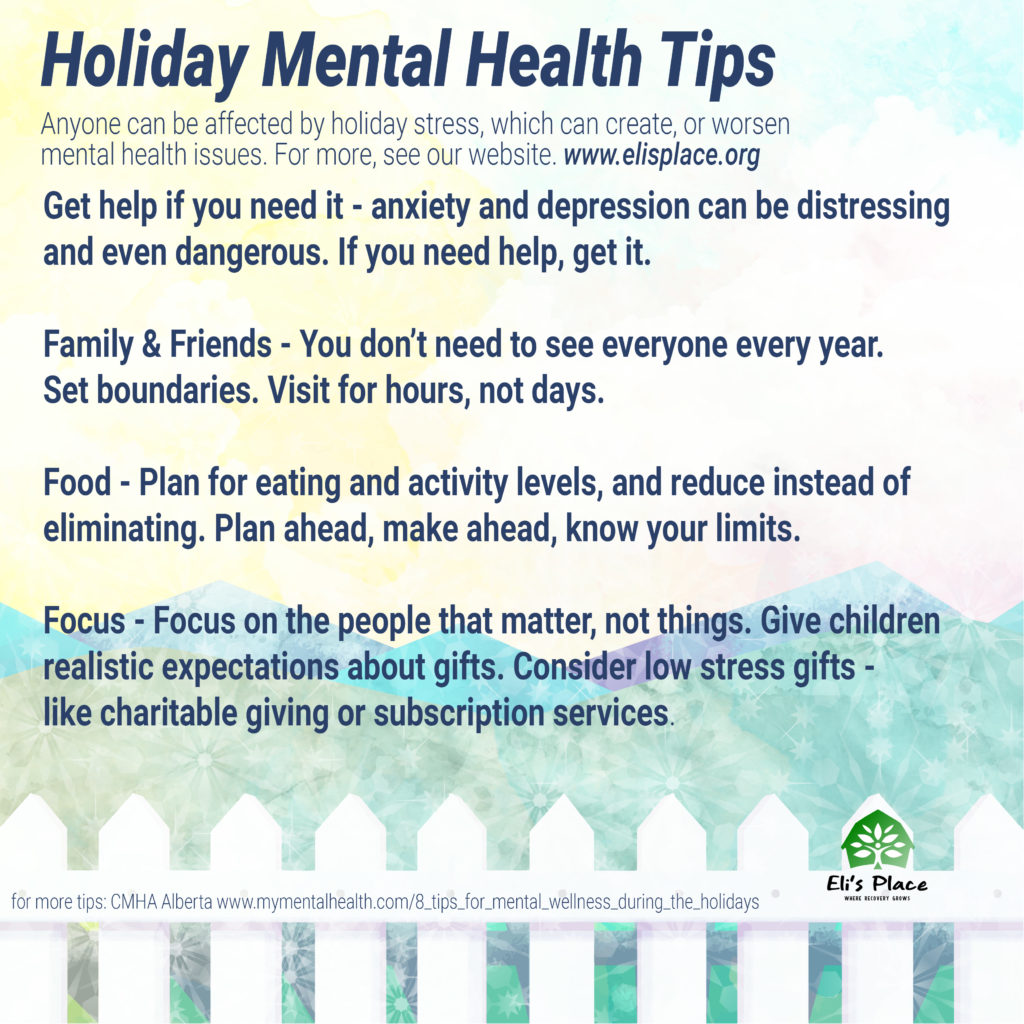It has been known for many years now that during the winter holiday season, there is an increase in depression, and death, especially from cardiac events. One presumed cause for this is the increase in stress and conflict that can occur during the holiday season. For individuals with pre-existing mental health issues, or families dealing with loved ones who are experiencing serious mental illness or addiction issues, this can be an especially difficult time.
“At least some of the increase in cardiac deaths around the holidays might also occur because people put off needed care during this time of year or avoid seeking treatment for acute illness because they’re traveling away from home, the researchers also point out.
In particular, other research has documented a link between excessive drinking and a greater likelihood that people will develop or need treatment for heart problems.”
– Dr. Tim Stockwell, University of Victoria, British Columbia
Fortunately, there are things you can do to reduce the disruption of the holidays, maintain mental wellness and mitigate some of the more difficult aspects of this time of year. We have looked at several agencies who publish lists of tips and summarize them here.
As always, if you or a loved one is in crisis, contact a crisis line, or your nearest urgent care centre.
Here are some tips to help you manage stress and mental health during the holiday season:

Focus on What Really Matters
The people in your life are more important than things. Remind yourself of that frequently. Put it on a note on your mirror, or over your sink. It is a bit cheesy, but it is absolutely true and can help you keep your feet on the ground this season.
Handmade or low-stress gifts are wonderful. You can make “Good for One…” task coupons, or hug tokens. Your kids can make cards. If you happen to be a baker, baked goods are always well received – just keep it reasonable.
Charitable donations in the name of your loved one are low stress, low waste, and celebrate sharing and paying forward the joy and caring of the holiday season. We would, of course, recommend Eli’s Place but there are many charities that make holiday giving simple and meaningful. You can also purchase subscription services, or loot crate services, which take the stress out of giving, and spread the love over a whole year.
If you would like to make a donation to Eli’s Place in honour of someone you love this Holiday season, please see our Holiday Tribute e-card which can be sent from our donation page here.
Family & Friends
Family and friends can be wonderful, but there is a lot of pressure to perform at the holidays. Here are some tips for managing this stress:
Limit your time with family and friends – measure your visit in hours, not days, or visit one group per year, rotating through over time.
Don’t engage in conflict if you can avoid it. Politics are important but leave the debates for a time when people are not already stressed and tired.
Set boundaries around acceptable behavior and stick to them.
Food, Drink & Gifts
Set expectations for your children and family at a reasonable level. Talk about what gifts mean, and what they are for, and what they are not for. It is much healthier to tell someone you love them, than to try and demonstrate it with gifts you can’t afford, or things they don’t really need.
On that note, make a budget, and take it seriously. Money is one of the greatest stressors in our lives, so managing this part of the holidays goes a long way. There are many simple ways to make gifts that will be just as meaningful (if not more) than purchasing expensive things people may not even need.
Alcohol has been incorporated into the Holidays as a given, which can be expensive and also painful for people who struggle with addiction. Don’t be afraid to say your Holiday parties will be alcohol-free, or if you want to avoid spending exorbitant amounts of money on drinks, request that your guests bring their own.
Try not to buy into the shame and judgement of others. Your cooking is fine. You look great just as you are. The judgement of others is more about them than it is about you. Take some time for yourself and keep your perspective firmly in hand. You are in charge of you, and how you feel.
Stay Healthy
Over-eating, over-drinking and a lack of physical activity over the Holidays can contribute to mental health disturbances. If you know these things negatively impact you, take steps to ensure you are able to stay relatively healthy:
Food: have a healthy snack before attending Holiday events to ensure you don’t overstuff yourself with sweets. Incorporate lots of healthy snacks into your own Holiday spreads.
Activity: maintain an exercise routine by getting up a little earlier to make it to the gym, go for a run or take a walk. Starting the day with some movement can help to maintain balance for the rest of the day.
Drinking: if you drink, set limits on your alcohol consumption. Plan in advance by bringing a set limit of alcoholic beverages so you aren’t tempted to over do it. If you or someone you know struggles with alcohol consumption, host an alcohol-free party or reach out to the hosts of events you are attending to ensure there will be alcohol-free drinks available for those who are avoiding alcohol consumption.
Sleep: make like Cinderella and set an alarm on your phone at a reasonable time to leave so you can stay well-rested throughout the hustle and bustle of the Holidays. Getting enough sleep is key to handling stress.
Know Your Stress Relievers
Because the Holidays can be extra busy and social, sometimes we can forget to do the things that help us remain mentally balanced. It is important to know what your stress relievers are and make space to practice them during the busy Holidays.
Get up a little earlier in the morning to ensure you have time to do yoga or meditate. Take time at the end of the day to quietly sit with a book rather than scrolling through your phone where you will be tempted to look at email or answer texts. If you begin feeling overwhelmed in a social setting, remove yourself and go for a quick walk. Even taking a breather for 5 minutes in the bathroom at a Holiday party can help reset stress levels.
Plan Ahead
Reduce the stress that can arise from the unknown by minimizing surprises and staying organized. Create a calendar to outline which days you will go gift and grocery shopping. Plan your Holiday meals in advance and make lists of exactly what you need – this way when you go to the grocery store you won’t get overwhelmed and can move through the store based on exactly what you need (this will prevent you from making unnecessary purchases and from forgetting key ingredients!). Reach out to party attendees in advance to ask for help hosting so you don’t feel like everything falls on you – and if you don’t feel like cooking for a large group, make your gathering a potluck and ask everyone to bring a dish!
Plan when and where you may need space and time to take time outs for yourself (see above point about knowing your stress relievers).
Don’t Be Afraid to Say No
The Holidays can be busier than usual, with more events, get togethers, parties and shows to attend than at other times throughout the year.
You will likely get requests to attend Holiday events from friends and family. If you begin feeling stressed and overwhelmed at how busy you feel, take a step back and decide which events you really feel compelled to attend and which ones you can skip. Don’t feel bad when you decline invitations – no one expects everyone to be able to attend everything during this time of year.
If someone tries to make you feel guilty, repeat to them your initial reason for declining and that you look forward to seeing them in the New Year when life calms down. People’s reactions are more about them than about you!
Don’t Overspend
Money is one of the biggest stressors people face over the Holidays – many people overspend because they want to make the Holidays special for loved ones, but the notion that we need to empty our bank accounts to tell someone we love them is just a product of our wasteful consumer society.
We mentioned making a budget and sticking to it, but what are the strategies for achieving this when you really don’t want to overspend?
Holiday Outfits: rather than splurging on something new, check out local thrift stores and consignment stores, or borrow a festive dress from organizations like RentFrockRepeat or Toronto’s FreshFashionLibrary.
Gifts: make your own! The Internet has opened a world of amazing DIY websites for those who want to get crafty. Check out this list of easy and beautiful handmade gift ideas and jump on Pinterest to search for more! Don’t have time to make your own gifts? Check out Toronto’s Holiday Gift Swap or hop on Bunz Trading Zone to trade for gifts (use the hashtag #GiftIt on Bunz to search for items the community deems giftable).
Decorations: as with gifts, there are many ways to make Holiday decorations cheaply (and sustainably). Pinterest can be a great resource for this, as can DIY websites such as Instructables.
Food: you can use an app such as Flashfood to find restaurants and grocery stores who are offering food coming up to its expiration date at steep discounts, or shop at Toronto’s pay-what-you-can grocery store.
Parties: host gatherings at home and ask each guest to bring a food item so that it doesn’t fall on you to purchase and prep all the food.
Get Help If You Need It
When we talk about help, it can take many forms. In a crisis, it might mean intervention by professionals. There are crisis lines, for adults and children, and if the situation is really dangerous, local hospital emergency rooms can be a way to get more immediate or crisis care.
If the situation is not as immediate, family doctors, clergy, counsellors and community leaders, can provide an entry into the mental health system, or provide some therapy to help individuals who are experiencing mental health issues, possibly arising from holiday stress.
If the situation is more manageable, remember that you can always ask others to help with preparations, visits, visitors, and shopping and cooking. Family and friends can provide some child care to relieve pressure on parents.
What is a crisis?
A mental health crisis is a situation in which there is imminent danger to the person or to others, that neither they, nor the people around them can control or contain.
During a crisis, it is important to get additional help. If there is danger to one or more persons, call 911, but be prepared for them to come and take control of the situation.
Some warning signs of an impending or present crisis include:
- Rapid mood swings
- Extreme energy or lack of it, sleeping all the time, or being unable to sleep
- Severe agitation, pacing,
- Talking very rapidly or non-stop
- Confused thinking or irrational thoughts
- Thinking everyone is out to get them or seeming to lose touch with reality
- They are experiencing hallucinations or delusions
- Making threats to others or themselves
- Isolating themselves from friends and family, not coming out of their room
- Not eating or eating all the time, rapid weight loss or gain
- Suicidal thoughts and statements such as “I want to die” or even possible vague statements such as “I don’t want to be here anymore”
(Association for Childhood Mental Health, 2018)
Why get help?
You will not be able to manage a crisis on your own, especially if this is unfamiliar territory. Crisis lines, mental health services, and hospitals can all be useful in a crisis.
The stigma around getting help can be powerful, but if your loved one is in danger, deal with the stigma later, and deal with the harm that might occur first.
How to Support a loved one experiencing distress
If the situation has not reached crisis level, then there are some basic things you can do. Listening carefully is very important. Don’t pass judgement, and don’t offer unsolicited advice. Just let the person tell you what is going on, and what they need. If you have criticisms of the way they are managing things, keep them to yourself until the situation is resolved, and then if necessary, have a discussion later, when everyone is calm.
Offer to help with tasks – cooking, cleaning, preparing, child care, or holiday organization. Provide them some relief from the stress associated with the holidays.
References
Barnett, Adrian, et al. “Revisiting the ‘Christmas Holiday Effect’ in the Southern Hemisphere.” Journal of the American Heart Association.
“Tips for Coping with Holiday Stress.” Mayo Clinic, Mayo Foundation for Medical Education and Research, 16 Sept. 2017.
“What Is a Mental Health Crisis & What To Expect When One Occurs.” ACMH.
There is a tremendous gap in our mental health system for young adults, aged 18 to 35, with serious mental illness. Eli’s Place will provide a long-term, rural residential treatment and recovery-based program.
We urge you to be a part of this revolution in mental health treatment. The first of its kind in Canada, Eli’s Place will offer individualized therapeutic care and recovery programs, with a graduated transition into the community. A range of programs will promote recovery and resilience through the acquisition of life and work skills needed to move from survival to living, and from mental illness to hopeful futures.




